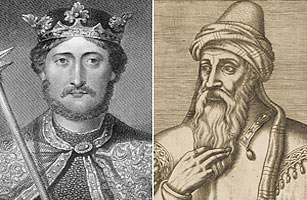
In tales like those of Robin Hood, King Richard the Lionheart is remembered charitably as a benevolent erstwhile monarch, lost to the Crusades in the Orient while his dastardly brother Prince John steals from the poor of England to give to the rich. Richard's return in the stories, though, always marks some proud English nationalist turning of the tide. In truth, Richard probably didn't care much for England at all, spoke mostly French, and spent the bulk of his adult life pursuing wealth and plunder with various armies abroad. The popular myth about his piety and love of England is ironically a product of his complete absence from what was a damp, musty isle at the edge of the world.
Instead, Richard found himself in the forefront of the Third Crusade of 1189 to retake Jerusalem, a city that had fallen two years before to an accomplished Muslim general named Salah ad-Din, or, as he would be remembered by European chroniclers, Saladin. For a brief time, Saladin, an ethnic Kurd, ruled over much of the Levant, Mesopotamia, the holy cities of Arabia and Egypt — lands whose wealth and civilization would have bewildered Richard and many of gold-seeking Crusaders. In short, the Third Crusade failed in seizing Jerusalem, though Richard's forces did score a small victory against Saladin at Arsuf in 1191. Sources from the time paint the rapport between Richard I and Saladin in high chivalric times, noting how Saladin dispatched his doctors to Richard when he heard the English was ill and two horses when Richard's one proved lame. Saladin is remembered in Europe still as this noble, chivalrous general from the east. But, as more recent historians argue, both he and Richard were brutal warriors, with little need or time for the pleasantries that have gone on to burnish their legend for centuries.